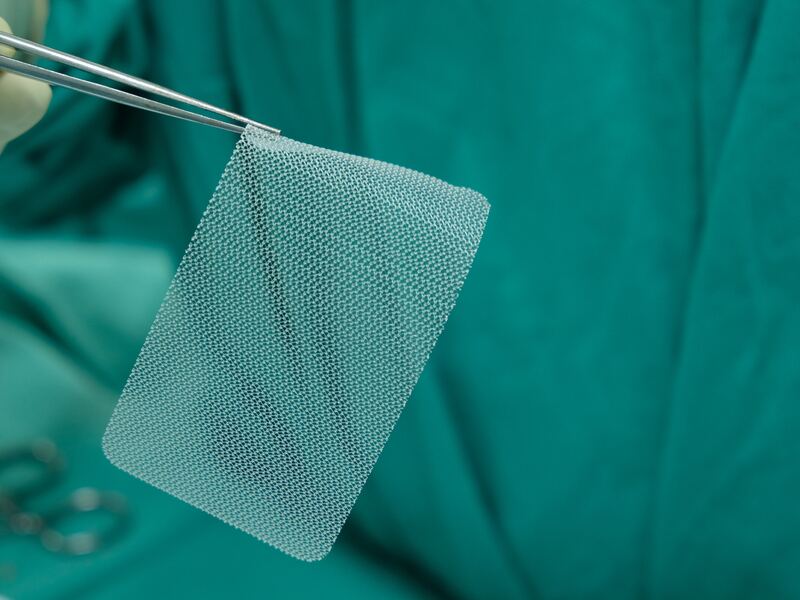Hernia mesh lawyer Toronto
Over the course of approximately the last 20 years, Canadian physicians, surgical patients, and product liability lawyers have been forced to confront the serious risks associated with surgical mesh, a device commonly used in hernia surgeries and other procedures. Surgical mesh - which is known as hernia mesh when used in hernia operations and transvaginal when used in surgeries to treat stress urinary incontinence - is used in approximately 100,000 operations every year in Canada. The occurrence of complications depends on the variety of surgery and type of hernia mesh being used. Since 2000, several varieties of hernia mesh have been banned or recalled in Canada, and several mesh implant lawsuits have sought compensation for suffering patients. If you or someone you know has experienced a hernia repair with mesh complications symptoms, contact a hernia mesh lawyer at Neinstein Personal Injury Lawyers to learn how we can help. Our team can provide guidance and advice as you seek compensation.
Book Free ConsultationWhat Is A Hernia And What Is A Hernia Mesh Used For?
A hernia occurs when an internal organ or piece of tissue bulges through the muscle or connective tissue that contains it. There are several varieties of hernia, including inguinal or inner groin hernias; femoral or outer groin hernias; umbilical hernias; hiatal or upper stomach hernias; and incisional hernias, which result from an incision. All hernias are caused by a combination of pressure to an organ and the existence of a gap or weakness in the wall of the cavity containing the organ. This pressure can be caused by a variety of everyday occurrences, such as constipation, persistent coughing, or lifting a heavy object. It is estimated that five per cent of people will experience a hernia at some point in their lives. Factors that may compound your risk of suffering a hernia include smoking, lung disease, obesity, pregnancy, previous open appendectomies, and a variety of genetic or hereditary factors, among others.
Hernia Treatments
Not all hernias require surgery: in some cases, prescribed medication, dietary adjustments, and lifestyle changes can adequately treat the symptoms. When surgery is required, however, most physicians turn to surgical mesh, inserted either through minimally invasive laparoscopic surgery or an open surgery. In either case, surgical mesh or hernia mesh may be used to patch the hole in your connective tissue.
What Is A Hernia Mesh?
Hernia or surgical mesh is a loosely woven sheet of mesh made from biological or inorganic materials including polypropylene, polyglycolic acid, and prolene. Permanent hernia meshes remain in the body following the procedure, whereas temporary meshes dissolve over time. Different procedures will require the use of different varieties of surgical mesh.
Hernia Symptoms
The symptoms of a hernia will vary depending on the individual who suffers it and the severity of the injury. In most cases, a lump or bulge in the affected region will materialize. Inguinal hernias often cause pain or discomfort when bending, lifting, or coughing; a sensation of pressure or heaviness in the lower abdomen; or a burning or aching sensation around the bulge.
Hiatal hernias - those affecting the upper stomach - sometimes cause acid reflux, chest pain, and difficulty swallowing when eating.
In certain cases, a hernia will present no symptoms at all. In these fortunate instances, the patient may be unaware of their injury until it is diagnosed through a medical exam. Symptom-free hernias do not require treatment.
Other Uses Of Surgical Mesh
Though hernia repair is its most common application, surgical mesh is also used to treat female stress urinary incontinence (trouble controlling urine) and pelvic organ prolapse (weakening of the muscles that hold the pelvic organs in place).
Surgical mesh is generally referred to as transvaginal mesh in these instances. Of the approximately 25,000 operations to treat stress urinary incontinence performed each year in Canada, about 90 per cent use mesh. Complications occur in about 1 to 2 percent of these cases. Complications are more common in operations using transvaginal mesh to treat pelvic organ prolapse, about 15 per cent or higher.
Hernia Mesh Product Recall, Complications, And Symptoms
Though complications occur in only a small percentage of surgeries using hernia mesh, the sheer number of procedures performed each year means thousands of Canadians are currently experiencing the negative side effects of complications. These complications can take many forms: the mesh may become dislodged from its intended resting place; it may tear, twist, or warp; it may erode into other organs.
The symptoms of these complications can range from unpleasant to severe, with many class action lawsuit claimants citing life-changing effects. These include infections, abscesses, perforations, and extreme or chronic pain. For many hernia mesh lawyers, chronic pain is the most pressing issue: Canadian media is full of reports of lives turned upside down by the pain affiliated with surgical mesh complications.
Another common consequence of hernia mesh complications is the need for additional surgeries. When a patient suffers complications from a procedure involving a permanent mesh, the mesh may need to be removed via an additional operation. These operations are often lengthy, impactful, and require significant recovery time. Worse still, they are not guaranteed to cure the symptoms. In many cases, the injury victims will continue to experience pain or discomfort long after the mesh has been removed.
More than 180 serious injuries and at least three deaths linked to hernia mesh complications have been reported in Canada since 2000. Many of these victims have sought the advice of product liability lawyers with the intention of launching a hernia mesh lawsuit.
If you believe that you have been injured as a result of a hernia mesh operation, contact an experienced personal injury or product liability lawyer to learn how they can help.
Hernia Mesh Recalls And Lawsuits
According to Health Canada, 12 different brands of hernia mesh have been recalled or banned from use since 2000. This includes the high-profile example of Physiomesh Flexible Composite Mesh, a product manufactured by Johnson & Johnson subsidiary Ethicon. The Physiomesh Flexible Composite Mesh was recalled in 2016 after Ethicon found that recurrence and reoperation rates using this mesh were higher than average. A number of surgical mesh products were also taken off the market in 2005 after causing perforations to nearby tissues and organs.
Today, thousands of Canadians are involved in class action abdominal mesh lawsuits against the manufacturers of surgical mesh. Tens of thousands more are seeking compensation in the United States and Great Britain. If you have suffered injuries as a result of the use of surgical mesh, you may be entitled to compensation and should contact an experienced personal injury lawyer for guidance.

Consultations
We are no longer accepting new claimants. Litigation has been completed.
No Legal Fees Until Your Claim is Successful
We are confident our proven strategy can assist you in obtaining your proper and rightful accident benefits. Toronto-based and serving all of Ontario, Neinstein Personal Injury Lawyers pursues your personal injury claim at no upfront or hourly cost to you, and there are no fees until your case is successfully resolved.
Explore Our FeesHear from our clients who have achieved life changing results
 5 out of 5 stars
5 out of 5 stars

 5 out of 5 stars
5 out of 5 stars

 5 out of 5 stars
5 out of 5 stars

 5 out of 5 stars
5 out of 5 stars

 5 out of 5 stars
5 out of 5 stars

 5 out of 5 stars
5 out of 5 stars

 5 out of 5 stars
5 out of 5 stars

 5 out of 5 stars
5 out of 5 stars

 5 out of 5 stars
5 out of 5 stars

 5 out of 5 stars
5 out of 5 stars

 5 out of 5 stars
5 out of 5 stars

 5 out of 5 stars
5 out of 5 stars

 5 out of 5 stars
5 out of 5 stars

 5 out of 5 stars
5 out of 5 stars

 5 out of 5 stars
5 out of 5 stars

 5 out of 5 stars
5 out of 5 stars

 5 out of 5 stars
5 out of 5 stars

 5 out of 5 stars
5 out of 5 stars

 5 out of 5 stars
5 out of 5 stars

 5 out of 5 stars
5 out of 5 stars

 5 out of 5 stars
5 out of 5 stars

 5 out of 5 stars
5 out of 5 stars

 5 out of 5 stars
5 out of 5 stars

 5 out of 5 stars
5 out of 5 stars

 5 out of 5 stars
5 out of 5 stars

 5 out of 5 stars
5 out of 5 stars

 5 out of 5 stars
5 out of 5 stars

Neinstein's Year in Review, 2020
2020 was a difficult year for most, but during these unprecedented times, we came out stronger together.
Helpful Links
Car Accidents
Learn More about Car Accident LawyersPublic Transit Accidents
Learn More about Public Transit Accident LawyersHigh Speed Accidents
Learn More about High Speed Accident LawyersWe're Here For Your Financial + Legal Recovery
When people are injured, most often they are unable to work and during these times, cash flow can become an enormous burden on the victim and their families. We recognize that our clients are suffering and are under enormous financial stress.
That is why we use the contingency fee arrangement. Under this arrangement, the client is not required to pay any fees or expenses unless the case is successful. If the client does not recover any monies from the lawsuit, there will be no legal fees.
We Are Your Claim Experts
Our lawyers have been representing seriously injured accident victims for more than 55 years. With experience in all areas of Ontario personal injury and medical malpractice law, our goal is to ensure that Ontario's most vulnerable residents get the representation they deserve.
Duncan Embury
Head of Litigation
Duncan is a Partner and head of Litigation at Neinstein Personal Injury Lawyers.
Duncan Embury
Greg Neinstein
Personal Injury Lawyer
Greg is the Managing Partner at Neinstein Personal Injury Lawyers.
Greg Neinstein
Jeffrey Neinstein
Personal Injury Lawyer
Jeff is a Partner and the Head of the Personal Injury Group at Neinstein Personal Injury Lawyers.
Jeffrey Neinstein

